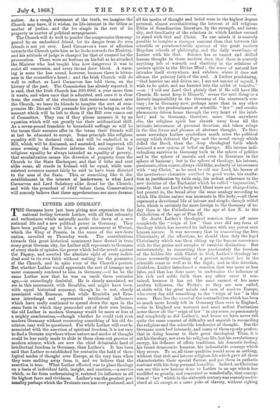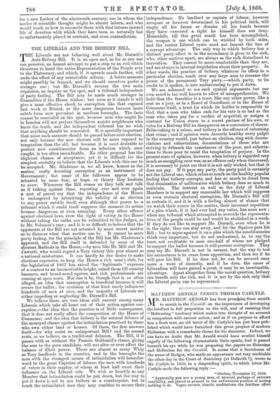LUTHER AND GERMANY.
THE Germans have just been giving new expression to the national feeling towards Luther, with all that solemnity and enthusiasm which naturally marks the dawn of a new national life and a new political power in Germany. They have been putting up to him a great monument at Worms, -which the King of Prussia, in the name of the new-born nation, unveiled on Thursday week. The contributions tOwards this great historical monument have flowed in from every great German city, for Luther still represents to Germans of every shade of opinion the power which led the revolt against the Papacy, and asserted the absolute right of every indivi- dual soul to its own faith without waiting for the guarantee of the Church, and in spite even of the Church's protest. But whether Luther would appreciate the sort of homage now most commonly rendered to him in Germany,—if he be the same Luther now that he was on earth three centuries ago,—is exceedingly doubtful. He is closely associated, we see in this monument, with Reuchlin, and might have been, with equal historical accuracy, though he is not, closely associated with Erasmus. But while Reuchlin and Eras- mus introducpcl and represented intellectual influences which have really continued to spread down the ages in the same form in which they proceeded out of their own brains, the old Luther in modern Germany would be more or less of a mighty anachronism,—though whether he could visit even modern Germany without recovering something of his old do- minion, may well be questioned. For while Luther will ever be associated with the assertion of spiritual freedom, it is not easy to find a German anywhere whose nature and modes of thought could be less easily made to slide in those clean-cut grooves of modern science, which are now the chief debateable land of intellectual freedom in Germany, than Luther's. It has been said that Luther re-established for centuries the hold of theo- logical modes of thought over Europe, at the very time when they were melting away from it, and we believe that the assertion is true. What Luther effected was to place theology on a basis of individual faith, insight, and emotion,—a service which, so far from undermining it, restored its influence in all its highest force and vividness. Luther's was the greatest per- sonality perhaps which the Teutonic race has ever produced, and all his modes of thought and belief were in the highest degree personal, almost overshadowing the interest of old religious Eddas of Scandinavian literature, by the strength, and inten- sity, and familiarity of the relations in which Luther seemed to stand with God and Christ. To our minds it is scarcely possible to imagine a stronger contrast than that between the scientific or pseudo-scientific systems of the great modern Hegelian schools of philosophy, and the daily wrestlings of Luther with his God. Science has so tamed and drilled human thought in these modern days, that there is scarcely anything left of warmth and elasticity in the relations of modern spirits to the Divine Mind ; the sense of natural law intrudes itself everywhere, and subdues, where it does not silence, the primary faith of the soul. A Luther proclaiming, "God hurries me and drives me, I am not master of myself, I wish to be quiet, and am hurried into the midst of tumults," —or, "I tell our Lord God plainly that if He will have His Church, He must keep it Himself," seems the next thing to a historic impossibility in the Germany of the nineteenth cen- tury; for in Germany now, perhaps more than in any other country, is the predominance of scientific " law " and secular phenomena driven home through the very heart of the intel- lect; and in Germany, therefore, more than anywhere else, the religious spirit has shrunk away from all the intimate intercourse of personal devotion, and taken refuge in the dim forms and phrases of abstract thought. To Ger- mans nowadays Luther symbolizes much more the political energy which defeated the Pope and the moral energy which defied the Devil, than the deep theological faith which fastened a new system of belief on Europe. His intense indi- vidualism survives to Germany both in the sphere of politics and in the sphere of morals, and even in literature in the sphere of humour ; but in the sphere of theology, his intense, passionate, often coarse, always childlike, audacity of intercourse with "my Christ," as he used to call our Lord, his horror of the meritorious character ascribed to good works, his exulta- tion in justification by faith only, his ardent adherence to the new doctrine of the Eucharist which he called " impanation," namely, that our Lord's body and blood were not changed into, but present in, the bread after the same analogy according to which His divine nature was incarnate in His body,—all these represent a devotional life of intense and simple, though wilful love, which is certainly far more foreign to the Germany of to- day than is the Catholicism of the age of Leo X. to the Catholicism of the age of Pius IX.
No doubt Luther's theological reaction threw off more completely the "reign of law" than ever did any form of theology which has asserted its influence with any power over human nature. It was necessary that in reasserting the free Christianity of the affections, he should thus defy the legal Christianity which was then silting up the human conscience with its fine grains and scruples of casuistic distinction. But unfortunately, in reasserting thus passionately the freedom of the hidden life with Christ in God, Luther's theology be- came necessarily something of a protest against law in the scientific sense as well as in the legal ; and in this direction, doubtless, Luther introduced a reaction that was more or less false, and that has done more to undermine the influence of his rich and noble faith than any other error it con- tained, because it has set the most earnest of his more modern followers, the Pietists, as they are now called, at strife with the great minds and men of modern Europe, who every day add something to the "reign of law" in this sense. Here lies the secret of the contradiction which has been so much more keenly felt in Germany than even in England, —for in England our warmest and most ardent Puritanism never threw off the "reign of law" in any sense, so passionately and completely as did Luther's, and hence we have never felt quite the same amount of difficulty and anguish in reconciling the religious and the scientific tendencies of thought. But the Germans must feel intensely, and many of them openly profess, that in doing honour to their great theological Titan, it is not his theology, nor even his religious life, but his revolutionary energy, his defiance of effete traditions, his domestic feeling, his broad democratic humour, his indomitable courage which they revere. To us, all these qualities would seem as nothing, without that rich and intense religious life which gave all these characteristics their special flavour, and put them in pathetic contrast with his deep personal humility. Indeed, no Christian can see this new honour done to Luther in an age which has modified so greatly, and renovated so wonderfully, that concep- tion of "law" which in the sixteenth century was scarcely under- stood at all except as a mere yoke of slavery, without sighing
for a new Luther of the nineteenth century, one in whom the modes of scientific thought might be almost inborn, and who would teach us how to reconcile them with that intense inward life of devotion with which they have been so naturally but so unfortunately placed in contrast, and even contradiction.































 Previous page
Previous page